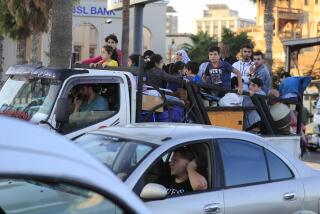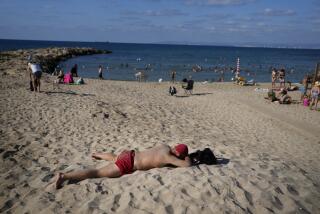In Syria’s capital, a sense of nowhere to hide
DAMASCUS, Syria — President Obama’s decision to seek congressional approval for a strike on Syria provided a respite for worried Damascus residents, but many feared it would be short-lived.
The announcement Saturday came as preparations continued in the capital for an anticipated U.S. missile barrage in retaliation for the government’s alleged use of chemical weapons on Aug. 21.
With two weeks left before schools are scheduled to open, Syrian soldiers and pro-government paramilitary forces have moved into school facilities throughout the capital. The move appeared to be part of an effort to shelter military personnel.
Civilian minivans and regular yellow taxis could be seen driving across town with uniformed soldiers as passengers, an unusual sight because troops are usually transported in designated buses. Military equipment and hardware was also being moved around.
Soldiers seen occupying schools in west Damascus seemed to be keeping a low profile. At one school, the hushed conversations of troops could barely be heard from outside the closed gates. One soldier arriving with takeout food for his comrades seemed to look left and right and over his shoulder before he swiftly entered the school through a side gate.
In addition, exhausted soldiers spilled into makeshift camps on sidewalks. The outdoor camps, especially near the city’s ubiquitous checkpoints, have been around for some time, but more may be popping up.
One such camp was next to the abandoned embassies of the United Arab Emirates and Qatar. The camp included a two-tier bunk bed, an outdoor stove and sleeping bags. In the midday heat, one soldier napped in the embassy guard booth, his bare legs sticking out onto the sidewalk. Another soldier sat on his motorcycle leaning on his Kalashnikov rifle and tried to snooze.
Many residents of the Syrian capital are confused and worried, mystified by the seemingly endless talk in the West.
“When Israel struck, they didn’t talk about it in public for days on end,” said a 42-year-old man who identified himself only by his first name, Khaled. There have been as many as four reported Israeli bombardments of Syria this year.
“They just came one night and bombed their targets,” Khaled said. “So why are the Americans and Europeans talking about it so much? Who does that before an attack? It’s very strange.”
One woman, who for security reasons did not want to be identified, said she didn’t feel relieved by the delay. “I just got the message that it’s not going to be in the next couple of days,” she said. “But I don’t feel better about things at all.”
With so much speculation about when the U.S. strike might come, Damascenes have been stocking up on provisions, leaving some shops bare of certain items like bread. Some have prepared basements to use as shelters.
Many are trying to map out escape routes, but it’s not easy: The capital is heavily militarized, and every other block has a government building that could be a potential target. Generally, many people have a sense that there is nowhere to hide.
Some residents are wondering why the authorities have not issued any public statements instructing civilians on what to do before and during a strike. It is not even clear whether the air raid sirens will go off to warn people of an aerial attack. Until 2010, air raid siren “drills” were a weekly occurrence.
One woman said Secretary of State John F. Kerry could have provided some reassurance to residents of the capital during his Friday speech in which he blamed the Syrian government for the alleged chemical attacks.
“He could have told us, ‘Civilians don’t need to worry about our safety,’” the woman said. “It wouldn’t have hurt him to give us some peace.”
More to Read
Sign up for Essential California
The most important California stories and recommendations in your inbox every morning.
You may occasionally receive promotional content from the Los Angeles Times.










